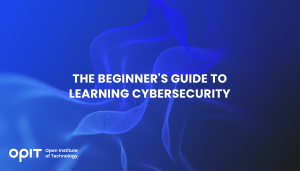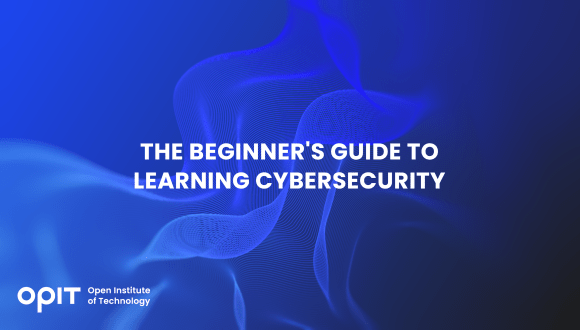

The world is shifting increasingly into an online world with every technological advancement. In this world, only one thing stands between your digital information and malicious actors – the presence of a cybersecurity team.
Cybersecurity professionals are in sky-high demand, and this trend isn’t slowing down. If you’re curious about joining their ranks and want to know how to learn cybersecurity, you’ve landed in the right spot. This roadmap will not only explain what cybersecurity is but how to get started in this exciting field.
Understanding the Cybersecurity Landscape
Cybersecurity might sound like a single, giant puzzle, but it’s more like a collection of smaller puzzles. It keeps the online space safe from threats and hackers, and the field spans various domains.
For example, network security keeps connections safe from attacks that lurk before you even access any website. On the other hand, application security fortifies the apps, while information security guards the data you share and store.
Another cybersecurity domain, ethical hacking, involves breaking into systems (legally, of course!) to find vulnerabilities before the bad actors do.
Learning about cybersecurity starts with getting familiar with the basics, such as concepts and key terms. Then, you have to keep up with the tech and threats, which means dipping into the latest trends in the cyber world.
Getting Started: Cybersecurity for Beginners
If you’re ready to address the question, “How to learn cybersecurity for beginners,” you’ll be glad to know that getting started isn’t complicated. The following steps will get you started in the right direction:
- Step 1: Basic Knowledge. Many resources are easily discoverable online for free. Look for tutorials, blogs, and free courses that introduce the core concepts of cybersecurity.
- Step 2: Formal Education. Once you’re comfortable with your basic know-how, it’s time to dive into structured learning. Paid, full-curriculum online courses and certifications for beginners are more comprehensive. Organizations like CompTIA and (ISC)² offer foundational certifications like Security+ and SSCP.
- Step 3: Practical Experience. Learning theory is a great way to build a solid foundation, but cybersecurity is a hands-on field. You’ll need practical experience, so take part in labs, simulations, and project-based learning like Hack The Box or CyberSecLabs to apply what you’ve learned in the real world.
OPIT’s Role in Cybersecurity Education
OPIT’s cybersecurity program give you a strong base in cybersecurity principles blended with the real-world side of the field with practical, hands-on applications. You will team up with experts who know the ins and outs of cyber threats, the latest tech defenses, and strategies that work.
There’s even more.
OPIT’s lectures and exams are nothing like the typical classroom-style courses you might’ve found at other educational institutions. In the program, you’ll have access to virtual labs and have you work on live projects. You’re being given the keys to a safe cyber playground where you can test skills, make mistakes, learn, and grow without the risk of letting the real intruder in.
Building Essential Cybersecurity Skills
Here are some of the core skills every beginner needs to develop to enter the complex and ever-evolving sphere of digital security.
- Encryption is how information stays safe from prying eyes online. As a beginner, learning encryption means learning how to use these secret codes to protect data and keep it readable only by the intended recipient.
- Network protocols are the web’s traffic rules. Getting to grips with these protocols will help you understand how data travels across the web and how to keep it secure as it does. You learn the pathways and the signposts – HTTP, HTTPS, FTP.
- Cybersecurity picks apart your mindset as much as it does the tools and technical skills. Sharpening analytical thinking is akin to becoming a digital detective. You’ll learn to look beyond the obvious and piece together clues to uncover potential threats before they strike.
- Every day in cybersecurity brings a new problem to solve, like finding a vulnerability in a network or responding to a cyber-attack. Your problem-solving ability to think on your feet and devise solutions will be your greatest asset.
However, while all these skills are invaluable and necessary, there’s one aspect that, if you’re lacking, might set you back from becoming top of the field. The cybersecurity field is as much about connections as it is about computers. By participating in webinars, attending conferences, and joining forums, you keep your knowledge up to date and build a network of peers and mentors. These interactions can inspire new ideas, offer support in tackling challenges, and open doors to opportunities in cybersecurity.
Why Choose a Career in Cybersecurity
Beyond asking how to learn about cybersecurity, you might also wonder why you should. It’s a career path full of excitement, challenges, and the immense satisfaction of making an impact on the world. Here’s why this field is worth considering:
In High Demand
Everything is going digital at an unprecedented rate. And with it, the need for skilled cybersecurity warriors. There’s a constant call for talent capable of safeguarding data and infrastructure against never-ending threats. Stepping into cybersecurity means you’re stepping into a realm where your skills are a shield for everyone’s very existence and functioning online.
Diverse Roles
Cybersecurity isn’t a one-size-fits-all career. It’s a mosaic of roles that cater to different interests and skills. For example, you might be intrigued by ethical hacking, fascinated by digital forensics, or drawn to creating secure networks. There’s always a niche for you. This diversity means you can find a path that plays to your strengths, keeps you engaged, and pushes you to learn more.
Making a Difference
Cybersecurity specialists are protectors. They shield not just bytes and data but people and their way of life. You have the power to prevent fraud, thwart cyberattacks, recover people’s precious data, and protect the privacy of individuals and the secrets of corporations. The impact is real, tangible, and incredibly rewarding.
Be the Cyber Warrior You’re Meant to Be
Cybersecurity starts with getting familiar with the basics and exploring accessible online treasures. You have to layer up knowledge with more structured learning as you dive into courses that challenge you more each time. Then, you get your hands dirty with actual work, where you learn the ropes by doing. The softer, more analytical skills will also be helpful, whether you’re taking time to figure out a complex problem or have to pivot for an immediate threat. And don’t forget to mingle in the cyber crowd—webinars, forums, the works.
Related posts

Source:
- EFMD Global, Published on July 12th, 2024.
By Stephanie Mullins
Many people love to read the stories of successful business school graduates to see what they’ve achieved using the lessons, insights and connections from the programmes they’ve studied. We speak to one alumnus, Riccardo Ocleppo, who studied at top business schools including London Business School (LBS) and INSEAD, about the education institution called OPIT which he created after business school.
Please introduce yourself and your career to date.
I am the founder of OPIT — Open Institute of Technology, a fully accredited Higher Education Institution (HEI) under the European Qualification Framework (EQF) by the MFHEA Authority. OPIT also partners with WES (World Education Services), a trusted non-profit providing verified education credential assessments (ECA) in the US and Canada for foreign degrees and certificates.
Prior to founding OPIT, I established Docsity, a global community boasting 15 million registered university students worldwide and partnerships with over 250 Universities and Business Schools. My academic background includes an MSc in Electronics from Politecnico di Torino and an MSc in Management from London Business School.
Why did you decide to create OPIT Open Institute of Technology?
Higher education has a profound impact on people’s futures. Through quality higher education, people can aspire to a better and more fulfilling future.
The mission behind OPIT is to democratise access to high-quality higher education in the fields that will be in high demand in the coming decades: Computer Science, Artificial Intelligence, Data Science, Cybersecurity, and Digital Innovation.
Since launching my first company in the education field, I’ve engaged with countless students, partnered with hundreds of universities, and collaborated with professors and companies. Through these interactions, I’ve observed a gap between traditional university curricula and the skills demanded by today’s job market, particularly in Computer Science and Technology.
I founded OPIT to bridge this gap by modernising education, making it affordable, and enhancing the digital learning experience. By collaborating with international professors and forging solid relationships with global companies, we are creating a dynamic online community and developing high-quality digital learning content. This approach ensures our students benefit from a flexible, cutting-edge, and stress-free learning environment.
Why do you think an education in tech is relevant in today’s business landscape?

As depicted by the World Economic Forum’s “Future of Jobs 2023” report, the demand for skilled tech professionals remains (and will remain) robust across industries, driven by the critical role of advanced technologies in business success.
Today’s companies require individuals who can innovate and execute complex solutions. A degree in fields like computer science, cybersecurity, data science, digital business or AI equips graduates with essential skills to thrive in this dynamic industry.
According to the International Monetary Fund (IMF), the global tech talent shortage will exceed 85 million workers by 2030. The Korn Ferry Institute warns that this gap could result in hundreds of billions in lost revenue across the US, Europe, and Asia.
To address this challenge, OPIT aims to democratise access to technology education. Our competency-based and applied approach, coupled with a flexible online learning experience, empowers students to progress at their own pace, demonstrating their skills as they advance.
Read the full article below:

Source:
- The European, Summer 2024 Edition, Page 24
With careful planning, ethical considerations, and ensuring human oversight is maintained, AI can have huge market research benefits, says Lorenzo Livi of the Open Institute of Technology.
By Lorenzo Livi
To market well, you need to get something interesting in front of those who are interested. That takes a lot of thinking, a lot of work, and a whole bunch of research. But what if the bulk of that thinking, work and research could be done for you? What would that mean for marketing as an industry, and market research specifically?
With the recent explosion of AI onto the world stage, big changes are coming in the marketing industry. But will AI be able to do market research as successfully? Simply, the answer is yes. A big, fat, resounding yes. In fact, AI has the potential to revolutionise market research.
Ensuring that people have a clear understanding of what exactly AI is is crucial, given its seismic effect on our world. Common questions that even occur amongst people at the forefront of marketing, such as, “Who invented AI?” or, “Where is the main AI system located?” highlight a widespread misunderstanding about the nature of AI.
As for the notion of a central “main thing” running AI, it’s essential to clarify that AI systems exist in various forms and locations. AI algorithms and models can run on individual computers, servers, or even specialized hardware designed for AI processing, commonly referred to as AI chips. These systems can be distributed across multiple locations, including data centres, cloud platforms, and edge devices. They can also be used anywhere, so long as you have a compatible device and an internet connection.
While the concept of AI may seem abstract or mysterious to some, it’s important to approach it with a clear understanding of its principles and applications. By promoting education and awareness about AI, we can dispel misconceptions and facilitate meaningful conversations about its role in society.
Read the full article below:
- The European, Pages 24 to 26.
Have questions?
Visit our FAQ page or get in touch with us!
Write us at +39 335 576 0263
Get in touch at hello@opit.com
Talk to one of our Study Advisors
We are international
We can speak in:


